- Home
- E. E. Knight
Dragon Avenger Page 6
Dragon Avenger Read online
Page 6
Would that work?
She hurried down to the river, gulped down mouthful after mouthful, felt her stomach swell until she became sick with the fullness. . . .
The water came back up easily enough, a little sour-smelling, thanks to her empty belly.
But it worked.
She filled herself even fuller, until it seemed as though she could hardly draw breath from the liquid in her stomach—dragon innards were built for gorging—and learned a lesson when it came back up of its own accord on the stairs.
She took in less for her third load and made it all the way to the top.
“I’ve got something for you, Father,” she said.
He opened a weary, bloodshot eye.
She cast about and settled on the central slab Father braced himself against when he tried to move. It had a gutter running down the center, perhaps designed to catch and hold rainwater? She hopped up onto the edge, and with a loudish belch almost filled half the trough with water.
Father sniffed. “Tala! You’re a miracle!” He lapped at the water. “You are your mother’s hatchling, no doubt about it,” he said on the second trip.
“This is doing me wonders,” on the third. All the gorging and retching were exhausting, but she pressed on.
As she filled her stomach a fourth time, she felt a little woozy; the climbs up and down the rock were trying. She needed a meal. Would fish live in water this rough?
It turned out they did. They liked to wait behind the bigger rocks, sitting in the calm, waiting for a meal to be swept to them by the current. But they scattered when she dived in after them and disappeared into the bubbling water.
She thought it over and tried steering herself through the current.
This was far trickier, but with a little practice, she found she could shoot into the calm waters with water-lids lowered and snap down a fish quick as thinking.
But if her stomach was digesting fish, it wasn’t helping Father. He had blood and scale to make up. The juicy fish would help. Weren’t they shiny little bags of water, after all?
She dived into the river upstream, and after a wild ride round the reversal at the knob—and a bloodied nose on an unexpected rock—she had five fish in her belly. She took her time climbing the steps.
Father was asleep. Was his breathing less labored? Hard to tell. Wistala decided against waking him for a meal; the fish just felt too good in her gorge. Besides, they’d give her strength for more fishing. When Father woke, she’d try a few trips with a belly full of fish.
Two days—and a countless number of trips with fish swallowed whole—later, Father wasn’t his old self, but he could reach the river on his own in order to drink and wash the clotted moss from his wounds.
They’d extracted the oversized spear—Father called it a highpoon and told her dwarven war machines fired it to weigh down a dragon and bring him to earth. At one point, he’d had two in him and was plunging toward the lake around the dwarves’ battlements, when luckily the second tore free and he could just fly with the other. . . .
“They got me on that great bridge between those towers of rock,” Father said as he spat gobs of fire onto the chain links, which Wistala pounded with an edged rock under Father’s instruction, feeling that her shoulders would give way long before the chain. “There are caverns big enough for a dragon to get in at them, but they had the war machines concealed in decorative galleries, all woodwork and flower beds and curtains. I was hit before I heard the roar of the chains. Clever blighters.”
Finally the links gave way, and Father drew the highpoon out his other side, where it projected from his scale—the barbs on it made any other kind of extraction impossible.
Wistala almost swooned during the gory extraction. How did Father manage the pain?
Flying was beyond him, of course. He crept ever so slowly down the knob, shuffling his sii and saa and keeping grip with three while one explored the next step. Wistala fretted as he moved—this was almost as bad as seeing him lying in a pool of his own blood. An honorable death after battle had a twilight dignity to it. Seeing her strong, confident father, lord of her home cave, reduced to a slug’s pace down the gentlest slope of this rock pile brought new anguish.
The trip back up took all afternoon, it seemed.
“I never knew there could be such a fight,” he said as the sun set behind fire-edged clouds.
The old condor still waited above, looking a little droopy. Wistala wondered if he was molting at the thought of his feast living on day after day. She liked his companionship, though, and brought him a whole dead fish she found washed up on the riverside.
The condor didn’t mind the ants.
“The Wheel of Fire?”
“Where did you hear that?”
“Mother and Auron.”
Father bowed his head, nostrils shut. “I saw her. What happened to Auron?”
Wistala told him. The shouted warning . . . the elves chasing him . . . the story came slowly. She tried to give him mind-pictures but had to fill in the fuzzier parts with words.
“And here I thought he took after the grandsire on his mother’s side. That sounds like something my father would have done. And you, scales so thin they hardly keep out the raindrops, went on alone?”
“Yes.”
“You might have done better to have found a nook in the home cave and waited another year until you had your flame. A mouthful like you would be easy pickings for wolves, leave alone the hominids. But perhaps the wolves have been driven from these woods, too.”
“I wanted to find you. We’re all that’s left.” She didn’t— couldn’t—mention the copper and his betrayal. Father had grief enough.
“Perhaps,” Father said. “Some pair. A hatchling and a half-dead dragon. The hunt’s probably on already, you know.”
“In this wild country?”
“There’s no country too wild if there’s a wounded dragon down. I tried to confuse them by flying hard south and then circling around through cloud layer, but my wings gave out. An elf will pick up a piece of bird-gossip or those hounds will find me. That dragon-hunter will have a new piece of scale for his harness, and our line will go unavenged.”
“I’ll avenge it, Father, if it comes to that.”
“Were-oaths and corpse-curses are for drakes and dragons, daughter. Dragonelles get their vengeance by seeing clutches of eggs laid to take the place of the assassinated.”
“I told you that you should have left him be,” the condor said.
Father blew his nostrils out at the condor. “Only thing that’ll change the mind of a dragonelle of Irelia’s line is herself, Bartleghaff,” Father said.
“You know that old buzzard?”
Bartleghaff squawked: “Condor!”
“Know him?” Father snorted. “He’s my oldest friend.”
“Friend? You were waiting to eat him!” Wistala said to the condor.
“Of course he was,” Father said. “I wouldn’t want some stranger getting the best bits. Who better than an old skymate to serve the dragon-wake.”
“What a feast!” Bartleghaff said. “And my son’s got a hatchling of his own now, first year in the sky. Such a gobble we’d have, we’d all be too fat to fly for a week. You’d have been remembered fondly at every cliff-sit for a hundred years. We were gathering to see you off properly.” He fluffed his feathers again. “Till she came along.”
“For someone who dines on lips and vents, you offer complaints a plenty,” Father said. “That legendary politeness of your kind—if it ever existed—is on the wane as your years advance.”
“Tell me about the dwarves, Father. Why do you say they betrayed you?”
“They broke a bargain they struck with your mother. Strange, for of all the hominids, dwarves are the only ones who can be trusted to keep their word without crabbing. Serves us right for believing legends. Perhaps dwarvish honor, like so many of the other old truths, has been brought down by poisoned arrows.” He sent a significant gla
re Bartleghaff’s way.
“What was the bargain?” Wistala asked.
“It came from our need for a decent cave. Your mother and I had already seen our share of tragedy. For our first clutch, we were too high in the mountains and in too shallow a cavern. A bitter freeze took the eggs. Your poor mother. The next cavern had a seep of bad air, odorless, clinging to the floor. Again, no hatchlings stirring after the first weeks. I was inconsolable at that and gave up hope—all those years of searching wasted. While flying the southern reaches of these mountains, we came across a band of blighters, half of them hurt, and made an easy meal of them. While I chased the survivors off south, your mother nosed through their belongings for digestible metals.
“Up popped a dwarf. Your mother thought him well scarred from battle and a stout, strong sort, even for a dwarf. Now had I been there, I would have made an end to him, but your mother knew we were strangers to the mountains this far from the sea, and she conversed with him. He gave his name as Gobold of the Wheel of Fire clan.
“ ‘You’re unusually bold for a dwarf abovegrounds,’ your mother said.
“ ‘I’m in your debt,’ Gobold said, pouring out the contents of a small purse he carried. There was a goodly mouthful of silver for each of us to be had. Just the thing we needed to put the sparkle back in our scales after the long flight.
“ ‘Silver and salivation, what service have we done you?’
“Gobold replied: ‘You’ve finished a battle commenced days ago. The blighters outran us. Yea, they even outdug us.’
“Your mother let him talk, and he spoke of the decay of the human empire that once circled the Inland Ocean the way cave moss circles a pool. They’d given up their outposts in the southern mountains, and blighters filled some of their old caves and tumbles. The blighters were plaguing the dwarves’ trade routes and taking over mines.
“When he spoke of how the blighters filled several caves at the end of the southern mountains, closed them off from the dwarvish tunnels and roads in the Lower World so that the dwarves couldn’t get at them, your mother began to hatch an idea of her own. She told the dwarves that in return for six chests of gold and twelve of silver, we’d drive the blighters from those caverns and see that they never returned.
“ ‘Such a deed would long be sung at our Memorials, Queen of Dragons,’ Gobold said.
“ ‘I must consult with my husband before formally pledging tooth and claw to bargain. Perhaps you should seek the agreement of your clan?’
“ ‘That will not be difficult,’ Gobold said with a chuckle.
“In the end, the bargain was formally struck with many words and an etching on a silver war-shield. She had the dwarves pay us half in small sums as we brought back heads for counting. When it came to dealing with hominids, your mother was fond of the old dragon-saying: Trust, but keep an eye open.
“So we fought the dwarves’ war for them. I would have just forced my way into the cave and set fire to all within, but your mother demanded a more patient war that allowed us to build our strength even as we weakened theirs.
“We attacked their herds and their flocks, burned their Upper World crops, and took such blighter parties as were easily consumed by two dragons hunting by day or night. Such feasting we had—”
“Oh, yes . . . ,” sighed Bartleghaff.
“And when they sent out hunting parties or tried to trick and trap us, we got away without too much difficulty, and sometimes got a chance for our own tricks and traps, for your Mother has—had—a fine mind for that sort of thing. Many of the blighters left in despair, but a hard few stayed within their cave, scratching a living from the Lower World. Soon we made them afraid to cast a shadow outside their cave.”
“Did you destroy the battlements around the cave, then?” Wistala asked.
“Oh no, daughter, time is fiercer even than dragons. Hatchlings think the world began when their egg cracked—eh, Bartleghaff? Those old works date from the Age of Wheels, when the blighters first ruled the world before dragons tamed their appetites.”
“You must have gone in the caves eventually.”
“When we were fat and strong with full fire bladders and fresh iron-fed scales, we challenged the blighters in their own caves and drove them out. In a deep chamber, we found a place that fulfilled all our hopes.
“The blighters had diverted melt and underground springs to feed cave moss plantations and slug herds. It was deep enough to be out of any weather. Even a nice shelf in case of bad air! We let nature take its course and didn’t even object to a few bats’ helping fertilize the cave moss.”
“A triumph,” Wistala said, but wondered why there was no light in Father’s eyes, the way there had been before, when he spoke of his battles.
“Save for some hard words with the dwarves. Gobold sent some shifty bargainer who showed up with one chest of silver and one chest of gold and a great bag of gems and jewelry. His name was Quizzilick and he was a pogt if I ever met one. He gave us treble praise and precious little metal when we spoke to him on the shores of that great icy moat that guards the approaches to their twin halls.
“ ‘O dragons mighty, strong, sure, fierce (this went on for some time, daughter, until you began to hear the bats drop of boredom), your work shall be rewarded beyond even our bargain, for we bring you not monies but riches.’
“ ‘Riches to some, dross to others,’ I said. ‘A few gems are always welcome to a dragon’s appetite. They make for healthy, shining scale, but what we need are soft metals to replace scales lost in our joined war.’
“ ‘And our hatchlings must have some,’ your mother said. Her desire must have unguarded her tongue, for I’d never heard her make such a mistake when talking to dwarves. For even slow dwarvish minds might start turning at the thought of families of dragons being bred on their borders.
“In the end, Quizzilick slightly increased the amount of gold and gave us more jewelry that had rich strands of it, and a great deal of silver besides, but there was no end of grumbling. But we’d kept our part of the bargain, and when we quit them, we never troubled the dwar-lands.”
“How do you know it was the Wheel of Fire and not some other group of dwarves?” Wistala asked.
“I did not lose my head and attack the nearest dwarfworks, Tala. The etchings on their round shields and helm-circlets told me their tale of betrayal. The Wheel of Fire take pride in showing their flame-winged eagles.”
“Ironic,” Bartleghaff said. “So eager are they for eagle feathers and heads, they’ve killed off almost every one in these mountains. I’m glad they don’t have condors perching atop their standards.”
“Happy thought,” Father said. “I’d hear fewer complaints. But why bring up iron? Fault them for much, but not for the quality of their weapons. Finest steel, as I know too well.”
Bartleghaff preened his neck-tuft. “How can such wingspan be powered by so small a brain, you scaly sheep-roaster? I meant their insignia is ironic—irony, a form of elvish humor. Like having your tail burnt by your own fire.”
“Come to your perch, if you have one,” Father said. His eyelids drooped and his eyes were dull. Just telling a story had worn him—or perhaps old emotions had drained his hearts’ blood.
“I’m told by the battle-crows, curse their nest-pillaging feathers, that the flames signify dragonfire. Some story lost in the mists of time.”
“Whatever they learned of dragons they must have forgotten, to go murdering hatchlings,” Wistala said, but neither of the pair appeared to hear her. She could almost hear Mother’s voice above as she sang:
And for those who threaten clutch of flame,
To feel the wrath of dragon-dame!
Father yawned. “Time for sleep. A dragon must rest and all that. Daughter, I’ve had my fill of fish. See if you can catch something red-blooded unawares for breakfast, would you?”
Chapter 9
A week’s worth of breakfasts later—mostly fish, unfortunately for Father’s blood-hungry appetite—
Wistala smelled smoke in the evening twilight of the forest west of the river gorge.
Game had become scarce in the area around Father and Bartleghaff, who seemed to do little but befoul his perch and goad Father into burning him up like a feathery candle.
Smoke in the forest, with the wood so wet from the constant spring rains, could mean only one thing—hominids. No other creatures save dragons wielded so dangerous a weapon.
With luck, she’d have hers in a few more months. Coming aboveground early had its terrors, but she had to admit she was thriving on the variety of food to be found.
And speaking of variety of food—as she rolled the smoke smell around in her nostrils, she got the mouthwatering scent of charred flesh, which she hadn’t had since Father brought home a burned sheep to the egg shelf what seemed like a lifetime ago.
The smoke smell was as easy to follow as a bright moon on a cloudless night through the trees. After a little casting back and forth, she came to a wide hollow.
It was an unnatural sort of place, like a dry creek, only the bottom was filled with tiny broken stones all roughly the same size, and the overgrown banks carried no smell of running water, though every rill for miles was brim-full with the rains. The hollow bent around the peak of the hill as though a claw like Bartleghaff’s obelisk had scored the hillside. But from the heights, one could both see either end of the streambed-like cut for a goodly length and be out of the wind.
A dwarf had chosen to camp here.
“Great things have small beginnings,” Mother used to like to say when she and Jizara compared their minuscule size to her bulk.
Her vengeance would begin here. As a bonus, the dwarf had a string of ponies. Surely she’d bring down one or two and be able to carry several limbs back to Father before the birds made off with it all.
She stayed downwind in the smoke smell. Examining each sii-and saa-hold as she crept up, she reached a pounce point in the cut of the bank. Perhaps two bounds to reach the dwarf, and if he had an ax, he didn’t keep it beside him. . . .

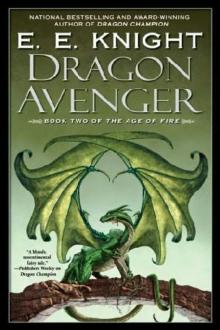 Dragon Avenger
Dragon Avenger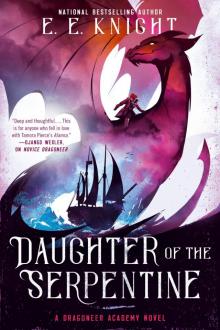 Daughter of the Serpentine
Daughter of the Serpentine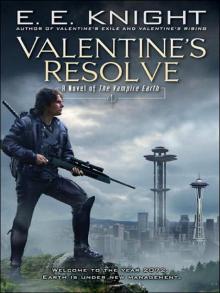 Valentine's Resolve
Valentine's Resolve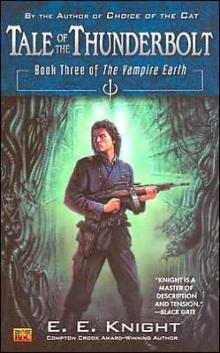 Tale of The Thunderbolt
Tale of The Thunderbolt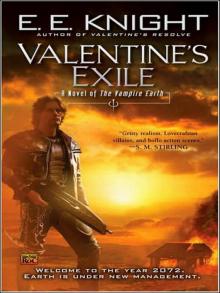 Valentine's Exile
Valentine's Exile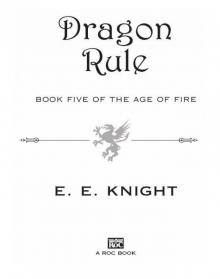 Dragon Rule
Dragon Rule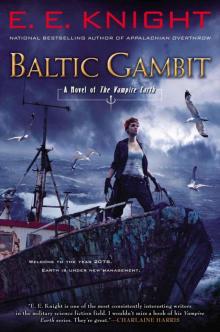 Baltic Gambit: A Novel of the Vampire Earth
Baltic Gambit: A Novel of the Vampire Earth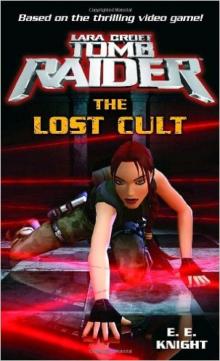 Lara Croft: Tomb Raider: The Lost Cult
Lara Croft: Tomb Raider: The Lost Cult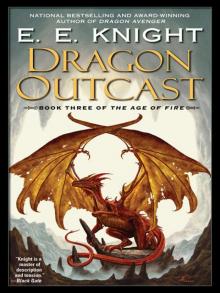 Dragon Outcast
Dragon Outcast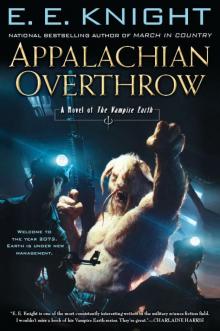 Appalachian Overthrow
Appalachian Overthrow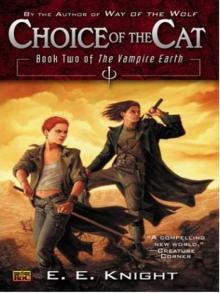 Choice of the Cat
Choice of the Cat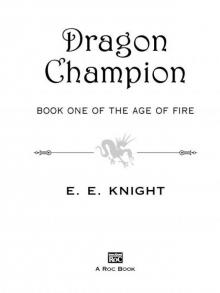 Dragon Champion
Dragon Champion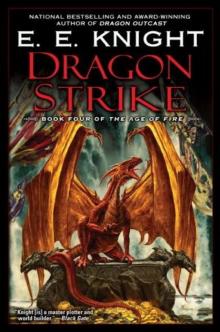 Dragon Strike
Dragon Strike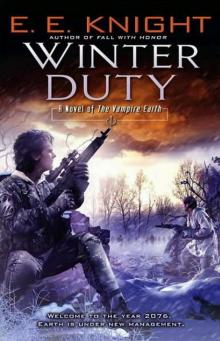 Winter Duty
Winter Duty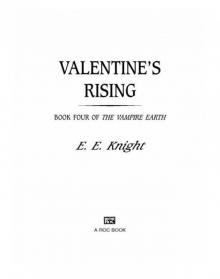 Valentine's Rising
Valentine's Rising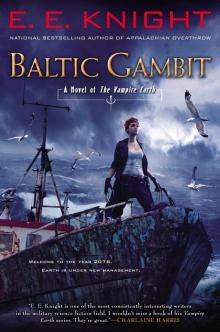 Baltic Gambit
Baltic Gambit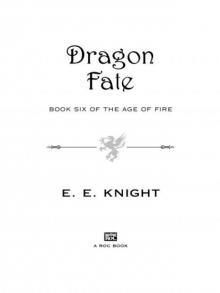 Dragon Fate: Book Six of The Age of Fire
Dragon Fate: Book Six of The Age of Fire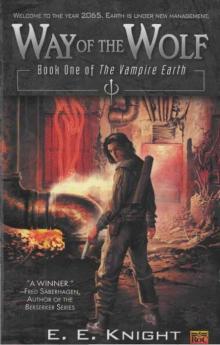 Way Of The Wolf
Way Of The Wolf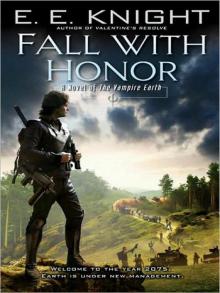 The Vampire Earth: Fall with Honor
The Vampire Earth: Fall with Honor